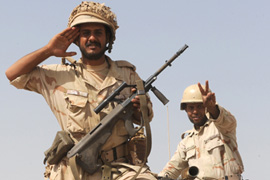Yemen says Iran funding rebels
Security chief tells Al Jazeera that Houthis would have been defeated without Iran’s support.

Yemen’s security chief spoke exclusively to Al Jazeera about Iran’s interference in the country
Yemen has repeated its accusation that Iran is funding Houthi rebel fighters in their war against government forces in the north of the country.
General Yahya Salih, Yemen’s counter-terrorism chief, told Al Jazeera on Sunday that it would be impossible for the group to be able to wage its campaign without foreign support.
“The Houthis cannot fund and fight this war with pomegranates and grapes or drugs,” he said.
“No doubt there is Iranian support, especially when you consider that the Yemeni state is spending billions of riyals.”
Yemen launched a military offensive against the Houthis in the northern Saada region in August after the group’s fighters stepped up its campaign against the government.
Neighbouring Saudi Arabia has become embroiled in the conflict in recent weeks, launching air raids and artillery strikes on suspected Houthi targets after the group crossed the border and reportedly seized a small area of Saudi territory.
Foreign intervention
Manouchehr Mottaki, the Iranian foreign minister, last week warned against perceived foreign intervention in the conflict.
| In depth |
  Inside Story: Foreign intervention in Yemen Inside Story: Foreign intervention in Yemen Video: Saudis tighten Yemen border control Video: Saudis tighten Yemen border control  Video: Iran warns against Yemen meddling Video: Iran warns against Yemen meddling Video: Saudi worried over Houthi fighters Video: Saudi worried over Houthi fighters Video: Interview with Yemen’s president Video: Interview with Yemen’s president Foreign states blamed in Yemen war Foreign states blamed in Yemen war Profile: Yemen’s Houthi fighters Profile: Yemen’s Houthi fighters Inside story: Yemen’s future Inside story: Yemen’s future |
“Countries of the region must seriously hold back from intervening in Yemen’s internal affairs,” he told a news conference in Tehran.
Mottaki also said that Yemen needed to “rehabilitate relations” with its public, including the Shia minority from which the Houthi fightyers come, adding that Iran had already announced its willingness to mediate between them.
But Salih told Al Jazeera that Tehran had no right to question Yemen’s treatment of ethnic or religious minorities.
“Who has given Mr Mottaki the right to talk about minorities?
“Minorities are persecuted in Iran, just recently they executed Kurd activists. He who lives in a glass house shouldn’t throw stones.”
The Houthis, who are from the Shia Muslim Zaidi sect, first took up arms against the government of Ali Abdullah Saleh, the president, in 2004, citing political, economic and religious marginalisation by the Saudi and Western-backed administration.
‘Expansionist agenda’
Yemen’s religious leaders have also denied any discrimination against Shia Muslims.
Hamoud al Hitar, Yemen’s minister of religious affairs, told Al Jazeera: “The Houthis are an armed movement using force to achieve their goals.
“They have an expansionist agenda and this was evident when they started fighting Saudi Arabia, it shows that the want to create a state in northern Yemen and southern Saudi Arabia.”
 |
| Saudi Arabia said it would keep up its air strikes against Houthi rebels until they pull back [AFP] |
Saudi forces continued to bombard Houthi positions in the 2,000m Jebel al-Dukhan mountain area over the weekend and Riyadh has said the attacks will continue until the rebels withdraw more than 10km from the Saudi-Yemeni border.
Ali Larijani, the speaker of Iran’s parliament, on Sunday condemned the Saudi involvement as the two nations stepped up the rhetoric over what many analysts say is a proxy war between the two Middle East powers.
“The deplorable events in the Islamic nation of Yemen which have intensified over the past two weeks and the Saudi interference in Yemen through repeated bombings by warplanes is astonishing,” he said.
“Reports indicated that the government of the United States is co-operating in the oppressive measures.”
The Houthi rebels say that Riyadh is providing bases inside Saudi Arabia for Yemeni forces to conduct attacks on their positions, while Yemen says that Iran is shipping weapons to the group.
Nine Saudis – five soldiers and four civilians – have been killed in fighting with Houthi fighters on the border since November 3.